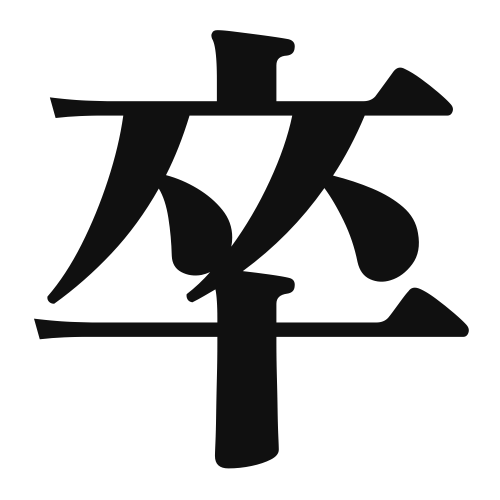1. Overview of Meaning
The kanji “卒” (sotsu) primarily means “to graduate” or “to complete.” It signifies the end of a certain stage, often in the context of education, but can also refer to finishing a task or project.
2. Formation and Radical
Formation of the Kanji: The kanji “卒” is a phonetic-ideographic character (形声文字). It combines the meaning of “to leave” or “to exit” with a phonetic component that suggests its pronunciation.
Radical: The radical for “卒” is “卒” itself, which relates to the concept of completion or graduation.
3. Examples of Usage
Common Words and Phrases:
- 卒業 (sotsugyō) – graduation
- 卒業生 (sotsugyōsei) – graduate
- 卒論 (sotsuron) – graduation thesis
Example Sentences in Daily Conversation:
- 彼は大学を卒業しました。 (Kare wa daigaku o sotsugyō shimashita.) – He graduated from university.
- 卒業式は来週です。 (Sotsugyōshiki wa raishū desu.) – The graduation ceremony is next week.
4. Synonyms and Antonyms
Similar Kanji:
- 完 (kan) – meaning “complete” or “finish,” but used in different contexts, such as completing a task.
- 修了 (shūryō) – meaning “completion” of a course or program, often used in educational contexts.
Antonyms:
- 未卒 (misotsu) – meaning “not graduated” or “incomplete.”
- 中途 (chūtō) – meaning “in the middle” or “halfway,” indicating that something is not finished.
5. Cultural and Historical Background
Relation to Japanese Culture: The concept of graduation is significant in Japanese culture, marking a transition from one stage of life to another, especially in education. It is celebrated with ceremonies and traditions.
Proverbs and Idioms:
- 卒業は新たなスタート (Sotsugyō wa aratana sutāto) – “Graduation is a new start,” emphasizing the idea of moving forward after completing a phase.
